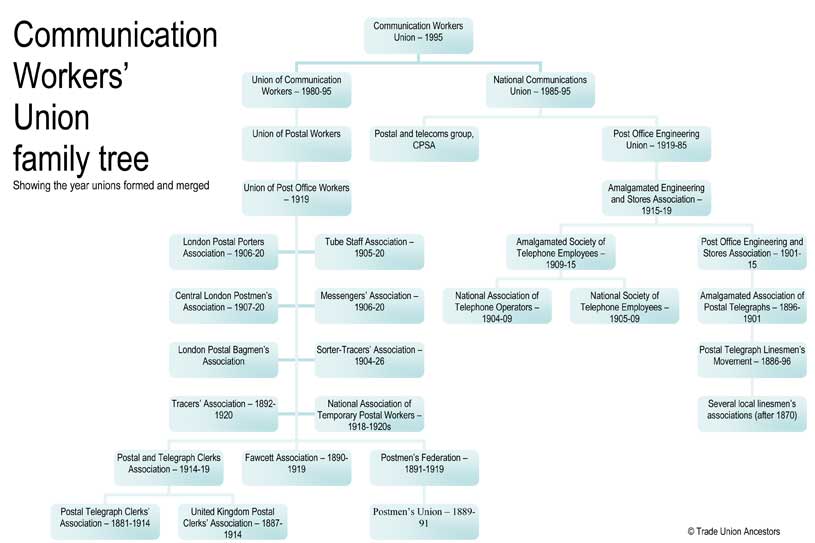It is important that you check out our Privacy policy, so that you know your rights, and you know what cookies we use.
Our Privacy PolicyA brief history of the CWU
The North East Region of the Communication Workers Union
 A brief history
A brief history
The Communication Workers Union, (CWU) has a long history starting most recognisably with the Post Office Staff Associations that had their origins in the nineteenth century.
The first recognisable unions were formed in the final 20 years of the nineteenth century, between 1880 and 1900 when there was a real collective organisation across the Post Office. This included the founding of:
The United Kingdom Postal Clerks Association, founded by provincial Post Office clerks (1887)
The Postmen's Union (1889)
The Fawcett Association, comprised of London sorters (1890)
Although the major pay claims were unsuccessful, the right to meet in public was secured over this period. The first large scale strike occurred in 1890. By the turn of the century, every Post Office grade had gained a representative association.
From this time until the outbreak of the First World War there were a number of large-scale public enquiries into the grievances of Post Office employees. Arguing the case of the lower grade workforce was the National Joint Committee (also known as the Amalgamated Postal Federation), which was a precursor of the UPW. There were five main hearings that were respectively overseen by:
Tweedmouth (1895-7)
Bradford (1904)
Hobhouse (1907-8)
Holt (1912-13)
Gibb (1914)
By the time of the Hobhouse inquiry, the union associates were recognised for the purposes of negotiation and much better, broader representation rights for Post Office employees was secured by the time of the Gibb inquiry. By this time the British labour movement had become heavily unionised and the period 1912-14 was one of acute industrial unrest on a broad scale. Many important concessions were gained during the Holt inquiry.
In 1919, the 44 representative associations of various workers employed by the Post Office were amalgamated into the Union of Postal Workers (UPW). The amalgamated UPW was set up at the time when the government introduced the Whitley Councils, in 1919. The Whitley system dominated inter-war wage bargaining for the civil service as a whole.
Despite having little involvement in the general strike of 1926, the UPW became subject to the 1927 Trade Disputes and Trade Unions Act which prohibited civil servants from joining unions affiliated to the Trade Union Congress. This state-enforced ban on trade union collusion in pursuing joint industrial interests circumscribed the effectiveness of the UPW until the end of the Second World War when this legislation was overturned.
For the remainder of the twentieth century, the history of Post Office unionism was dominated by secessionist groups and the difficulties of keeping the UPW unified in its industrial negotiations. Because the amalgamated UPW acted on behalf of a variety of job types, special interest groups composed along similar lines to the pre-amalgamated associations continued to exist. They broke away from the UPW and competed for their respective and often conflicting interests.
After the Second World War, the major secessionist groups in the post-war era were:
The National Guild of Telephonists
The National Association of Postal and Telegraph Officers
The Engineering Officers (Telecommunications) Association
The Clerical and Administrative Workers Union
The Association of Professional Executive Clerical and Computer Staff (after 1972)
In the immediate post-war period, the new Labour government changed the political and economic environment by committing to full employment. In addition, an enlarged civil service gave the UPW more bargaining leverage and gradual, significant improvements in pay and conditions were secured through the 1950s.
In 1965, Tom Jackson became the UPW General Secretary. The following years were turbulent times for the UPW with protracted negotiations over capital and labour and instances of industrial action, which culminated in the largest strike in the history of the Post Office in 1971. This was a six-and-a-half week national strike of all UPW members in January and February 1971 and the UPW failed to gain the wage demands it had made in October the previous year when its members voted 14-1 to end the strike.
The strike had long-term consequences for the UPW and the Union changed its name in 1980 to the UCW. This also coincided with the time when the Post Office ceased to be a government department and was stripped of its telecommunications functions (this was privatised as BT in 1984).
On the 26th of January 1995, the UCW merged with the National Communications Union (NCU) - a mainly telecommunications union that was a relatively recent creation when, in 1985, the Post Office Engineering Union (POEU) merged with the Civil & Public Services Association Post & Telecoms Group (CPSA P&T Group).
The Communication Workers Union (CWU) was formed.
The CWU is the seventh largest union in Britain and it is affiliated to the Trades Union Congress (TUC). It is the second largest communication union in Europe (the largest being the German union ver.di) and it is affiliated to the relevant international trade secretariat that is called Union Network International (UNI).

Image with thanks to Trade Union Ancestors
Sources: A. Clinton 'The Post Office Workforce: A Trade Union and Social History' (London: Allen & Unwin, 1984) and the The British Postal Museum & Archive (POST 65).


